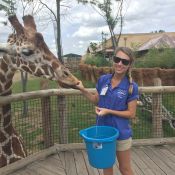
Zoology courses in the UK
Are you fond of animals? Zoology, or "the study of animals", is one of the oldest studies humans have engaged in. The reasons why we humans take an interest in animals and their behaviour have certainly changed over the course of history - but that it is still very exciting to learn about - there is little doubt about that. This course will give you the theoretical insight as well as the practical knowledge and experience required to gain a comprehensive understanding of modern zoology.
Some of the universities Across the Pond collaborates with are among the best in Zoology, and can offer some of the world's leading researchers and academics within this discipline. The course is available at undergraduate and postgraduate level, and there are often good opportunities for study abroad and work placement opportunities. Several of the universities have projects around the world - in over 20 countries on all continents - and you will have the opportunity to join exciting research work in the field! Whether it's gorillas in Uganda, sloths in Costa Rica, seals in Scotland, bears in Canada, snakes in Australia or fish in Norway, you will find a fieldwork project that suits you.
Teaching mostly takes place in the form of seminars in the classroom, workshops and laboratory work. Several of the universities also have close ties to organisations and institutions that work with animals and animal protection, so there are good opportunities to be placed in organisations and institutions that work with zoology and animal protection of various kinds, as part of the degree.
Zoology courses deal with elements within a number of different fields, and range from research at the cellular level to studies of entire animal species or groups of species and their environment. In the course of study, you will gain insight into topics related to biology, species diversity, ecology, environment, genetics, behavioural psychology in animals, physiology, palaeontology, veterinary and maritime subjects, to name a few. These are just some of the many subject areas you can choose from when you choose individual modules. You will often have the opportunity to sharpen your skills within what you want and thus be able to tailor your own course of degree according to your own interests - including which animals you are most interested in. These courses have lower minimum entry requirements than Veterinary science and can act as a stepping stone to enter Veterinary Science later.
MASTER'S DEGREE IN ONE YEAR
After completing an undergraduate degree, you have a broad background and you qualify for a number of master's degrees in, for example, Zoology, Veterinary Medicine (four years), or in Animal Behaviour and Welfare as well as within equine, biology or wildlife. In the UK you can apply for almost any master's degree without necessarily having an undergraduate in the same field of study. Of course, a relevant bachelor's degree would be advantageous, but it is not always a requirement. After completing an undergraduate degree, you will also be able to go on to a master's degrees in for instance Business, Management, Marketing etc. Across the Pond advisors are happy to send you suggestions for courses that will suit you. In the UK, a master's degrees usually takes one year.
JOB OPPORTUNITIES
There are many job opportunities for those with an education in Zoology. Many also choose to study for a master's degree or doctorate. Most students choose to apply for jobs with organisations, companies and institutions that work with animals.
Some choose to take the knowledge they have gained during their education into positions within research, animal protection or veterinary science. Others use their knowledge in relevant positions within media and communication. Many people want to work in as close contact with animals as possible and work within wildlife management, in zoos or in national parks. The possibilities are many and declining animal populations are proof enough that people like you are needed!
We also recommend working in your home country during the holidays while you are a student in the UK. When you are looking for a job after graduation, it will be a huge advantage to be able to have work experience on your CV, but it will also be very useful to start as early as possible to make contacts in working life. You often have long holidays as a student in the UK, so there are good opportunities to be able to go home and work during these periods.





